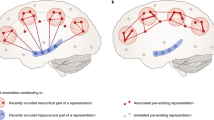Abstract
Experimental research with humans and animals suggests that sleep — particularly REM sleep — is, in some way, associated with learning. However, the nature of the association and the underlying mechanism remain unclear. A number of theoretical models have drawn inspiration from research into Artificial Neural Networks. Crick and Mitchinson's ‘unlearning’ and Robins and McCallum's ‘pseudo-rehearsal’ models suggest alternative mechanisms through which sleep could contribute to learning. In this paper we present simulations, suggesting a possible synthesis. Our simulations use a modified version of a Hopfield network to model the possible contribution of sleep to memory consolidation. Sleep is simulated by removing all sensory input to the network and by exposing it to a ‘noise’, intended as a highly abstract model of the signals generated by the Ponto-geniculate-occipital system during sleep. The results show that simulated sleep does indeed contribute to learning and that the relationship between the observed effect and the length of simulated sleep can be represented by a U-shaped curve. It is shown that while high-amplitude, low-frequency noise (reminiscent of NREM sleep) leads to a general reinforcement of memory, low-amplitude, high-frequency noise (as observed in REM sleep) leads to ‘forgetting’ of all but the strongest memory traces. This suggests that a combination of the two kinds of sleep might produce a stronger effect than either kind of sleep on its own and that effective consolidation of memory during sleep may depend not just on REM or NREM sleep but on the overall dynamics of the sleep cycle.
Similar content being viewed by others
References
Crick, F. and Mitchison, G.: The function of dreaming sleep, Nature Publishing Group, Nature 304 (1983), 111–114.
Robins, A. and McCallum, S.: The consolidation of learning during sleep: comparing the pseudo-rehearsal an unlearning accounts, Neural Networks 12 (1999), 1191–1206.
Jouvet, M.: The Paradox of Sleep, the Story of Dreaming, MIT Press, Cambridge, MA, 1999.
Smith, C., Young, J. and Young, W.: Prolonged increases in paradoxical sleep during and after avoidance task acquisition, Sleep 3, 67–81.
Westchester, I. L., Hopfield, J. J., Feinstein, D. I. and Palmer, R. G.: Unlearning has stabilising effect in collective memories, Nature 304 (1983), 158–159.
Fishbein, W.: Sleep and memory: look back, look forward. Sleep Research Society USA, Bulletin 3 1 (1995).
Smith, C. and Wong, P. T. P.: Paradoxical sleep increases predict successful learning in complex operant task, In: J. F. Disterhoft (ed.), Behavioral Neuroscience, Vol. 105, pp. 282–288, 1991.
Smith, C.: Sleep states, memory processes and synaptic plasticity, Behavioural Brain Research 78 (1996), 49–56.
Smith, C.: REM sleep and learning: some recent findings, In: A. Moffitt and M. Kramer (eds.) The functions of dreaming, pp. 341–362, State University of New York Press, Albany, NY, 1993.
Louie, K. and Wilson, M. A.: Temporally structured replay of awake hippocampal ensemble activity during rapid eye movement sleep, Neuron 29 (2001), 145–156.
Ficca, G., Lombardo, P., Rossi, L. and Salzarulo, P.: Morning recall of verbal material depends on prior sleep organization, Behavioral Brain Research 112 (2000), 159–163.
Dave, A. S., Yu, A. C. and Margoliash, D.: Behavioral state modulation of auditory activity in vocal motor system, Science 282 (1998), 2250–2254.
Dave, A. S. and Margoliash, D.: Song replay during sleep and computational rules for sensorimotor vocal learning, Science 290 (2000), 812–816.
Hopfield, J. J., Feinstein, D. I. and Palmer, R. G.: Unlearning has stabilising effect in collective memories, Nature 304 (1983), 158–159.
Hopfield, J. J.: Neural networks and physical systems with emergent collective computa-tional abilities, Proceedings of the National Academy of Sciences 79 (1982), 2554–2558.
Crick, F. and Mitchison, G.: REM sleep and neural Nets, Journal of Mind and Behaviour. 7 (2 & 3), 229–249.
Christos, G. A.: Investigation of the Crick-Mitchison Reverse-learning dream sleep hypothesis in dynamical setting, Neural Networks 9 (1996), 427–434.
Author information
Authors and Affiliations
Corresponding author
Rights and permissions
About this article
Cite this article
Walker, R., Russo, V. Memory Consolidation and Forgetting During Sleep: A Neural Network Model. Neural Processing Letters 19, 147–156 (2004). https://doi.org/10.1023/B:NEPL.0000023445.96334.eb
Issue Date:
DOI: https://doi.org/10.1023/B:NEPL.0000023445.96334.eb




